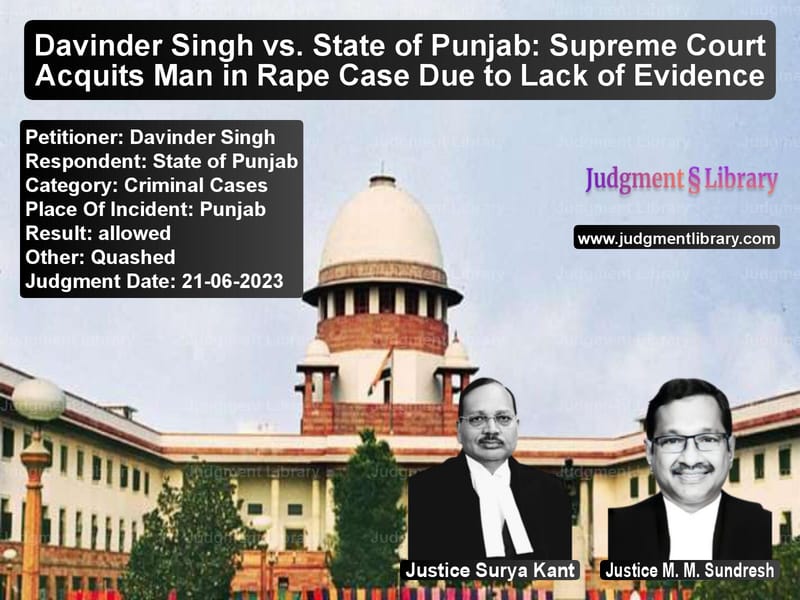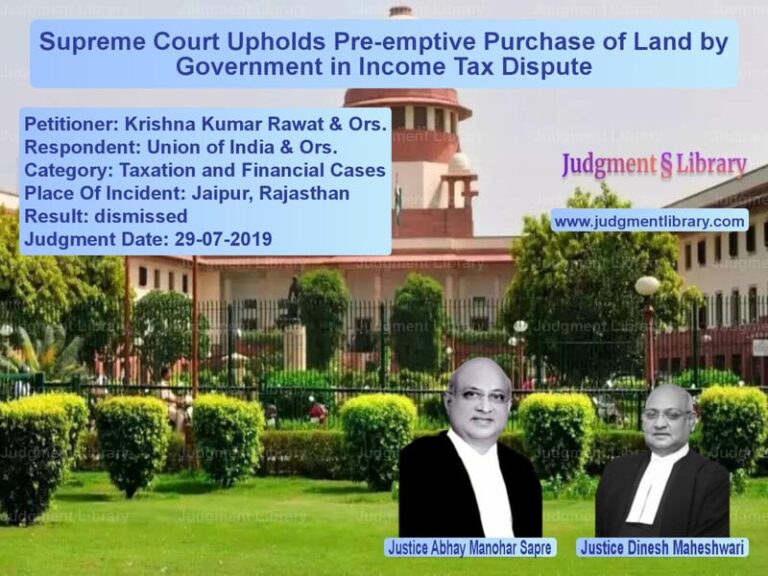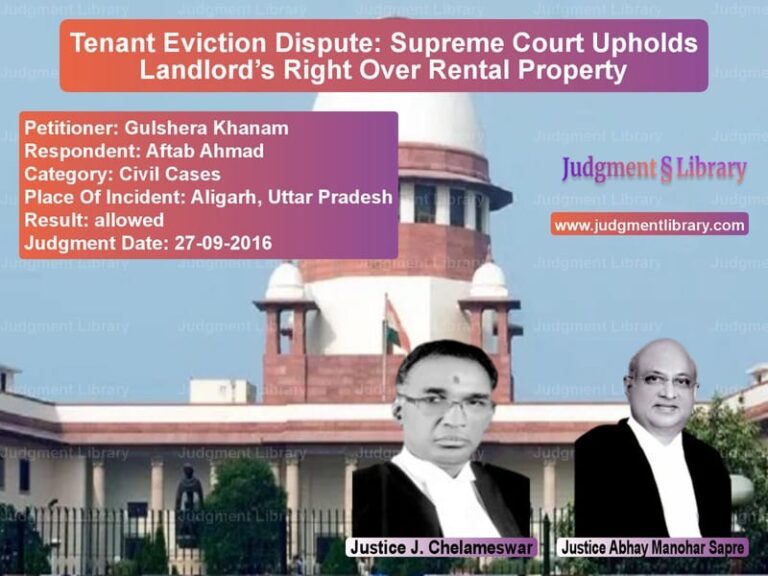Davinder Singh vs. State of Punjab: Supreme Court Acquits Man in Rape Case Due to Lack of Evidence
The case of Davinder Singh vs. State of Punjab is a significant ruling where the Supreme Court acquitted the appellant of rape charges under Section 376 of the Indian Penal Code (IPC). The judgment, delivered on June 22, 2023, overturned the conviction upheld by both the trial court and the Punjab & Haryana High Court. The case revolved around inconsistencies in the prosecution’s evidence, the delayed complaint, and the non-examination of crucial witnesses.
The appellant, Davinder Singh, was originally convicted by the Additional Sessions Judge (Adhoc), Fast Track Court, Amritsar, and sentenced to seven years of rigorous imprisonment. His appeal in the Punjab & Haryana High Court was dismissed, leading him to seek relief before the Supreme Court.
Background of the Case
The prosecution alleged that Davinder Singh committed rape on the prosecutrix (PW6) by entering her residence while armed with a knife. The key elements of the case included:
- The incident allegedly occurred on March 15, 2000.
- The prosecutrix’s brother, Pargat Singh, allegedly witnessed the incident, causing the appellant to flee.
- The prosecutrix’s father (PW4) initially filed a complaint only for a quarrel, without mentioning rape, citing concerns for his daughter’s dignity.
- On April 13, 2000, nearly a month later, an FIR was registered under Sections 376, 452, and 506 IPC.
- After the initial incident, the appellant and others allegedly threatened the prosecutrix at her uncle’s residence, prompting the belated complaint.
Key Legal Issues
- Whether the delay of 28 days in filing the rape complaint was justified.
- Whether the non-examination of key witnesses weakened the prosecution’s case.
- Whether the absence of medical or physical evidence affected the credibility of the prosecution.
- Whether the appellate court failed to properly evaluate the evidence on record.
Supreme Court’s Analysis and Judgment
1. Delayed Complaint
The Supreme Court scrutinized the 28-day delay in lodging the rape complaint, stating:
“Admittedly, there is a delay of 28 days in giving the complaint. The reasons assigned cannot be accepted as it defies reason and logic. If the intention of PW4 was to suppress the occurrence, there was no need to file a subsequent complaint.”
The Court found the explanation for the delay unconvincing, especially given that PW4 initially lodged a complaint about a quarrel but omitted allegations of rape.
2. Non-Examination of Key Witnesses
The prosecution failed to produce two critical witnesses:
- Pargat Singh, the prosecutrix’s brother, who allegedly witnessed the incident.
- Satnam Singh, the prosecutrix’s maternal uncle, at whose residence she was allegedly threatened.
The Court observed:
“The best person to depose would have been the uncle of the prosecutrix, Satnam Singh. There is no attempt to recover the knife, and no explanation for the failure to examine Pargat Singh.”
Referring to Takhaji Hiraji v. Thakore Kubersing Chamansing (2001) 6 SCC 145, the Court held that the non-examination of crucial witnesses allows an adverse inference against the prosecution.
3. Lack of Medical and Physical Evidence
The Supreme Court noted that no external injuries were found on the prosecutrix and no forensic evidence linked the appellant to the crime. The judgment stated:
“There is no attempt to recover the knife from the appellant, and there is no medical evidence corroborating the prosecution’s claim.”
4. Incorrect Findings by the High Court
The Supreme Court criticized the High Court for recording incorrect findings:
“The High Court has recorded a wrong factual finding that the offence under Section 376 IPC was committed even in the uncle’s residence, which is not even the case spoken by the prosecutrix.”
The Court held that the High Court had failed to properly analyze the contradictions in the prosecution’s evidence.
5. Possibility of a False Case
The Supreme Court noted that the appellant had previously expressed his desire to marry the prosecutrix, but her family opposed the match. The judgment suggested:
“It does appear that the appellant wanted to marry the prosecutrix, which was stoutly opposed by her family. The possibility of a relationship turning sour cannot be ruled out.”
Final Ruling
- The Supreme Court set aside the conviction and sentence imposed by the trial court and High Court.
- The appellant was acquitted of all charges, including rape, trespass, and criminal intimidation.
- The Court ordered that his bail bond be discharged immediately.
Implications of the Judgment
This ruling has critical implications for criminal jurisprudence:
- It reinforces the principle that delayed complaints in rape cases must be justified with strong reasons.
- It highlights the necessity of examining key eyewitnesses in criminal trials.
- It underscores that medical and forensic evidence play a crucial role in rape cases.
- It cautions courts against wrong factual findings that could lead to wrongful convictions.
Conclusion
The Supreme Court’s decision in Davinder Singh vs. State of Punjab is a reminder that criminal cases must be proved beyond a reasonable doubt. The judgment underscores the importance of timely complaints, credible eyewitness testimonies, and supporting medical evidence in rape cases. By acquitting the appellant, the Court has reaffirmed the fundamental principle that no individual should be convicted based on weak or contradictory evidence.
Petitioner Name: Davinder Singh.Respondent Name: State of Punjab.Judgment By: Justice Surya Kant, Justice M. M. Sundresh.Place Of Incident: Punjab.Judgment Date: 21-06-2023.
Don’t miss out on the full details! Download the complete judgment in PDF format below and gain valuable insights instantly!
Download Judgment: davinder-singh-vs-state-of-punjab-supreme-court-of-india-judgment-dated-21-06-2023.pdf
Directly Download Judgment: Directly download this Judgment
See all petitions in Bail and Anticipatory Bail
See all petitions in Judgment by Surya Kant
See all petitions in Judgment by M.M. Sundresh
See all petitions in allowed
See all petitions in Quashed
See all petitions in supreme court of India judgments June 2023
See all petitions in 2023 judgments
See all posts in Criminal Cases Category
See all allowed petitions in Criminal Cases Category
See all Dismissed petitions in Criminal Cases Category
See all partially allowed petitions in Criminal Cases Category







